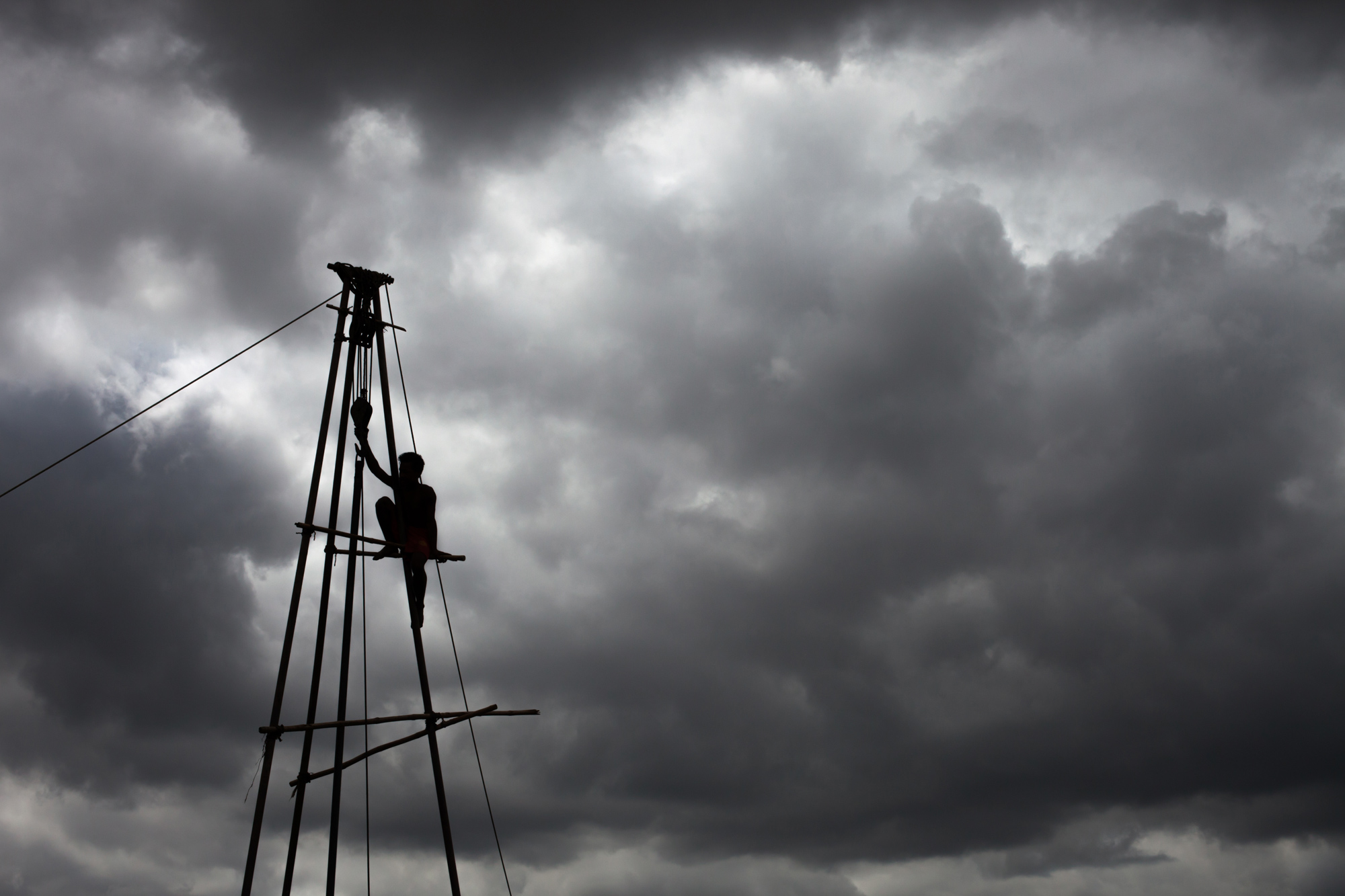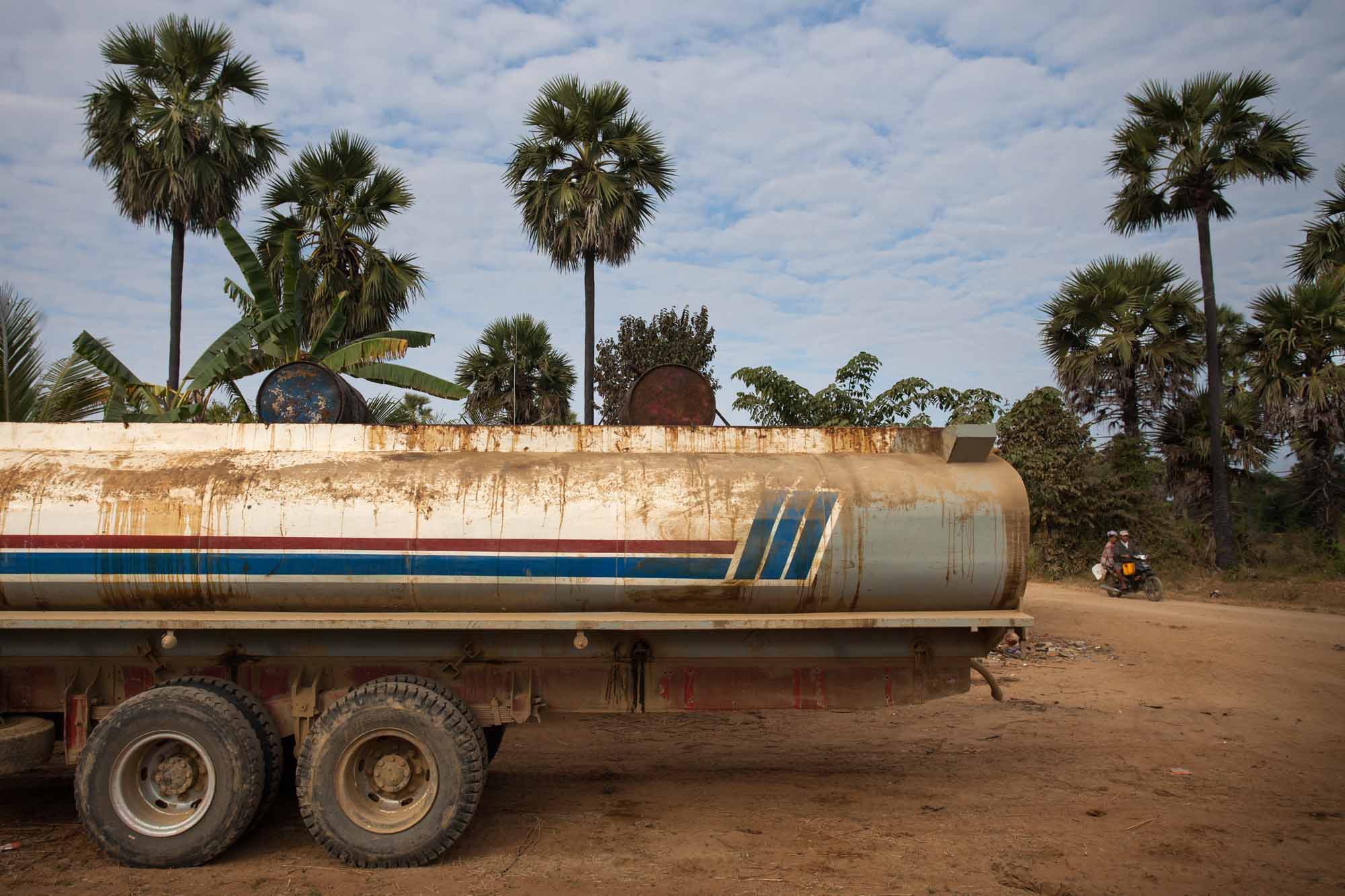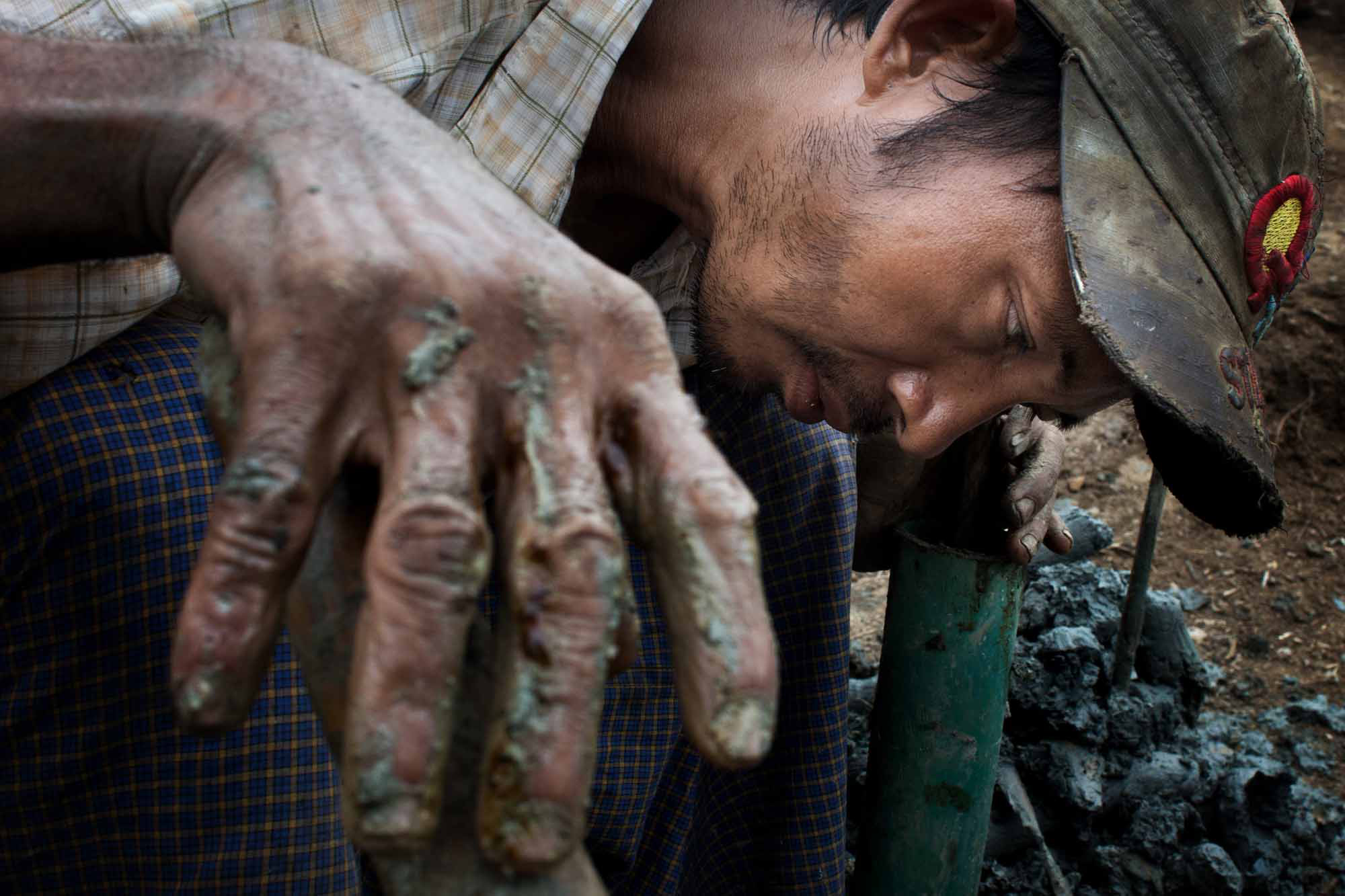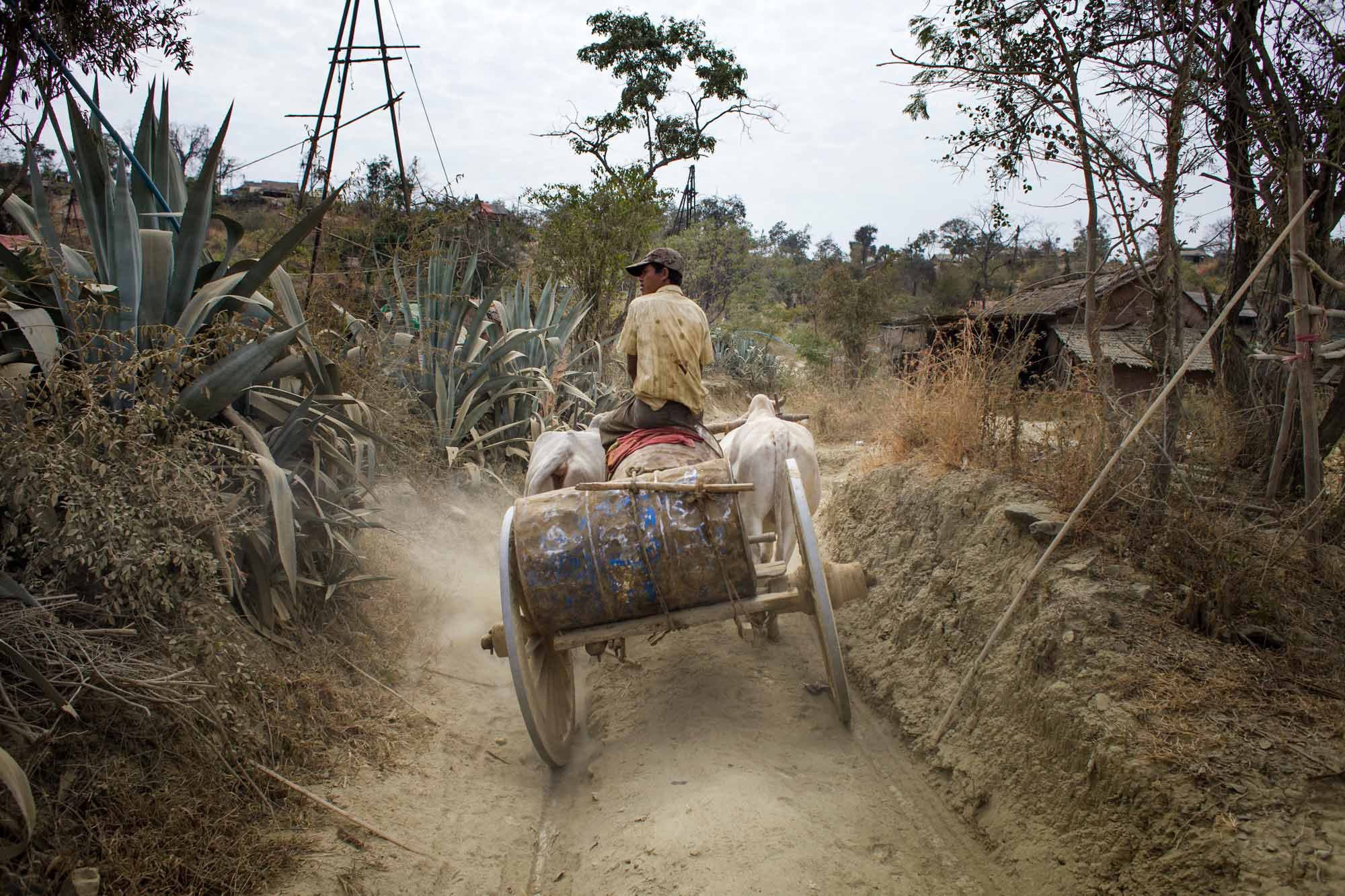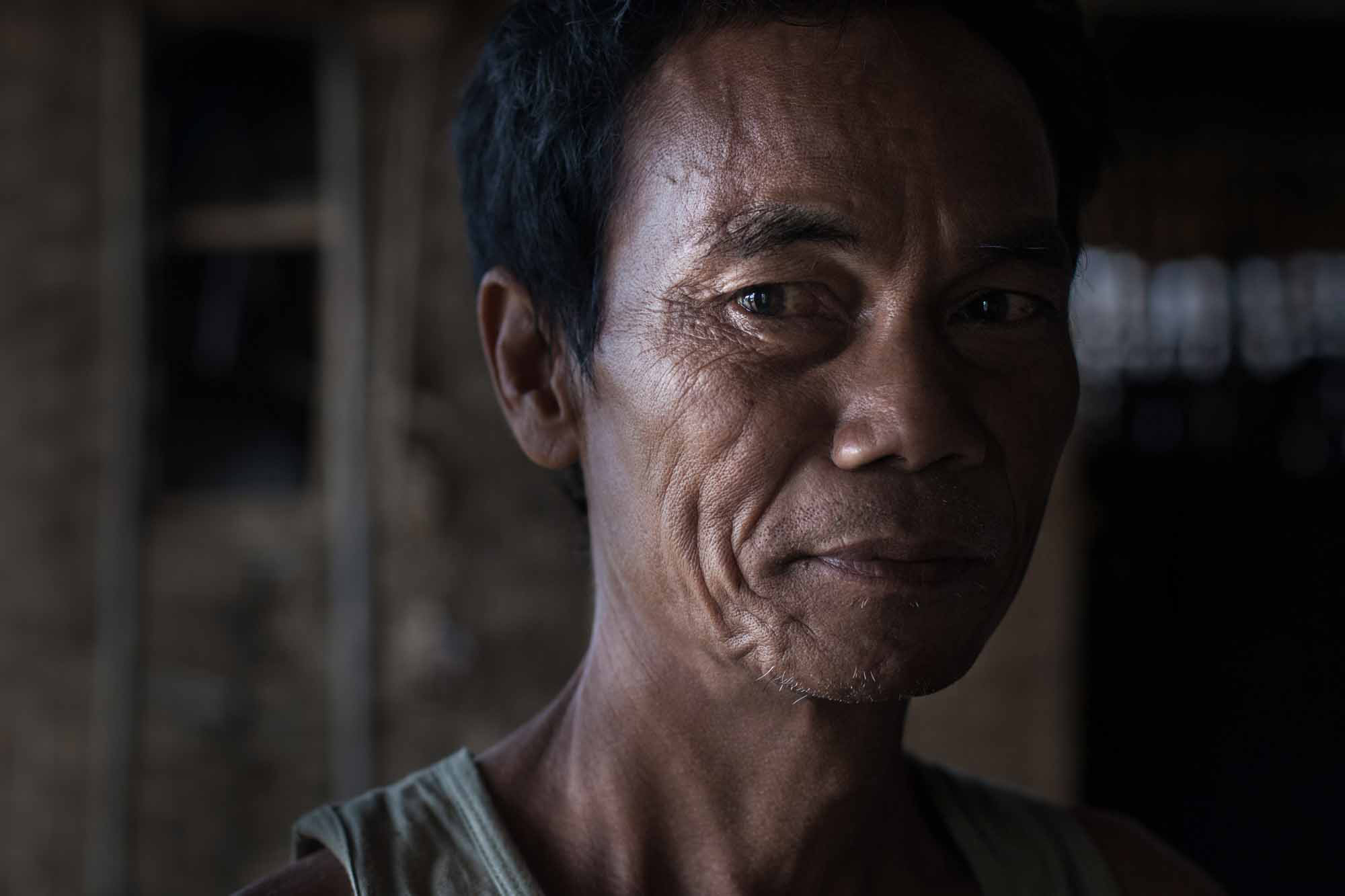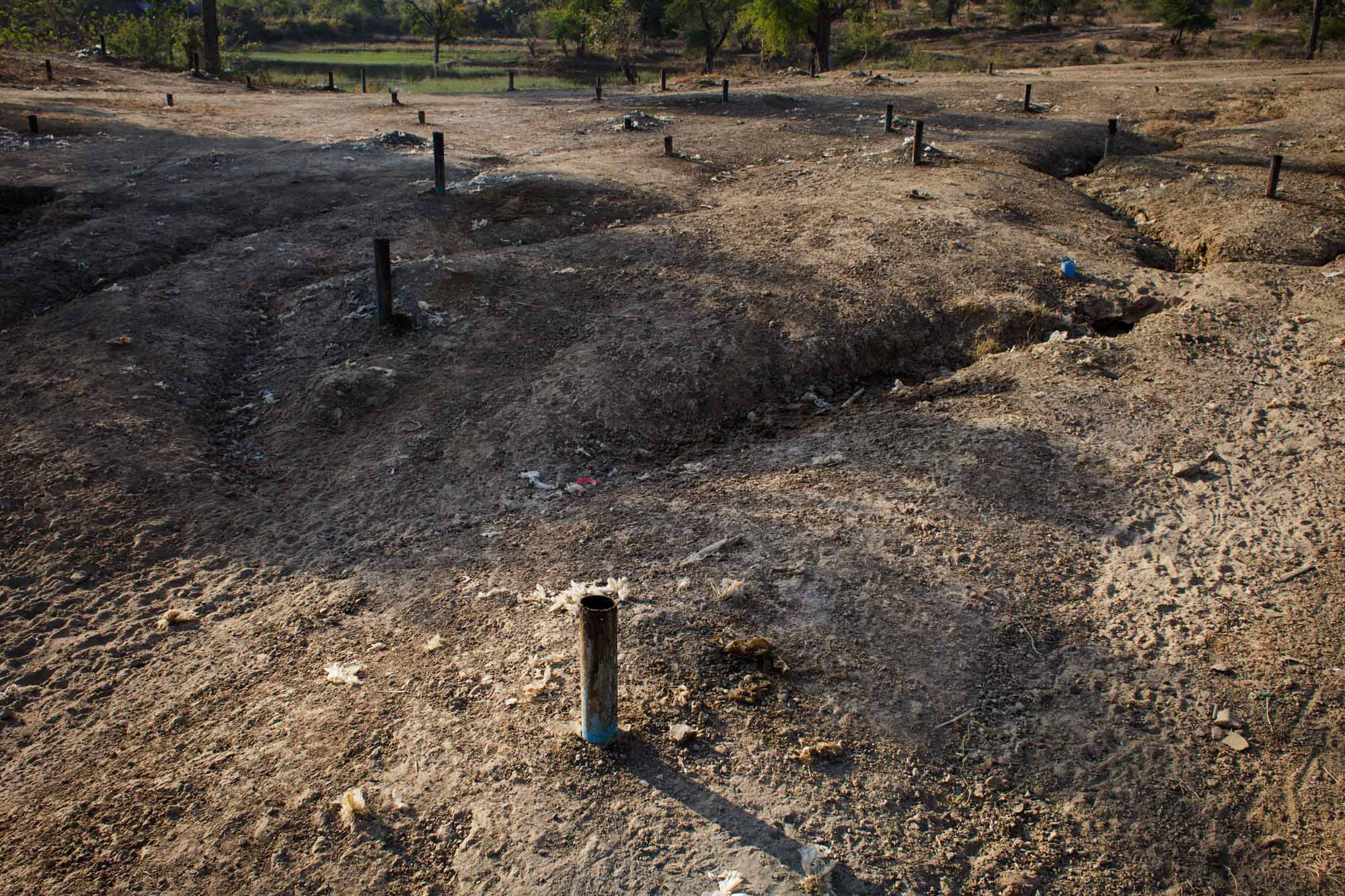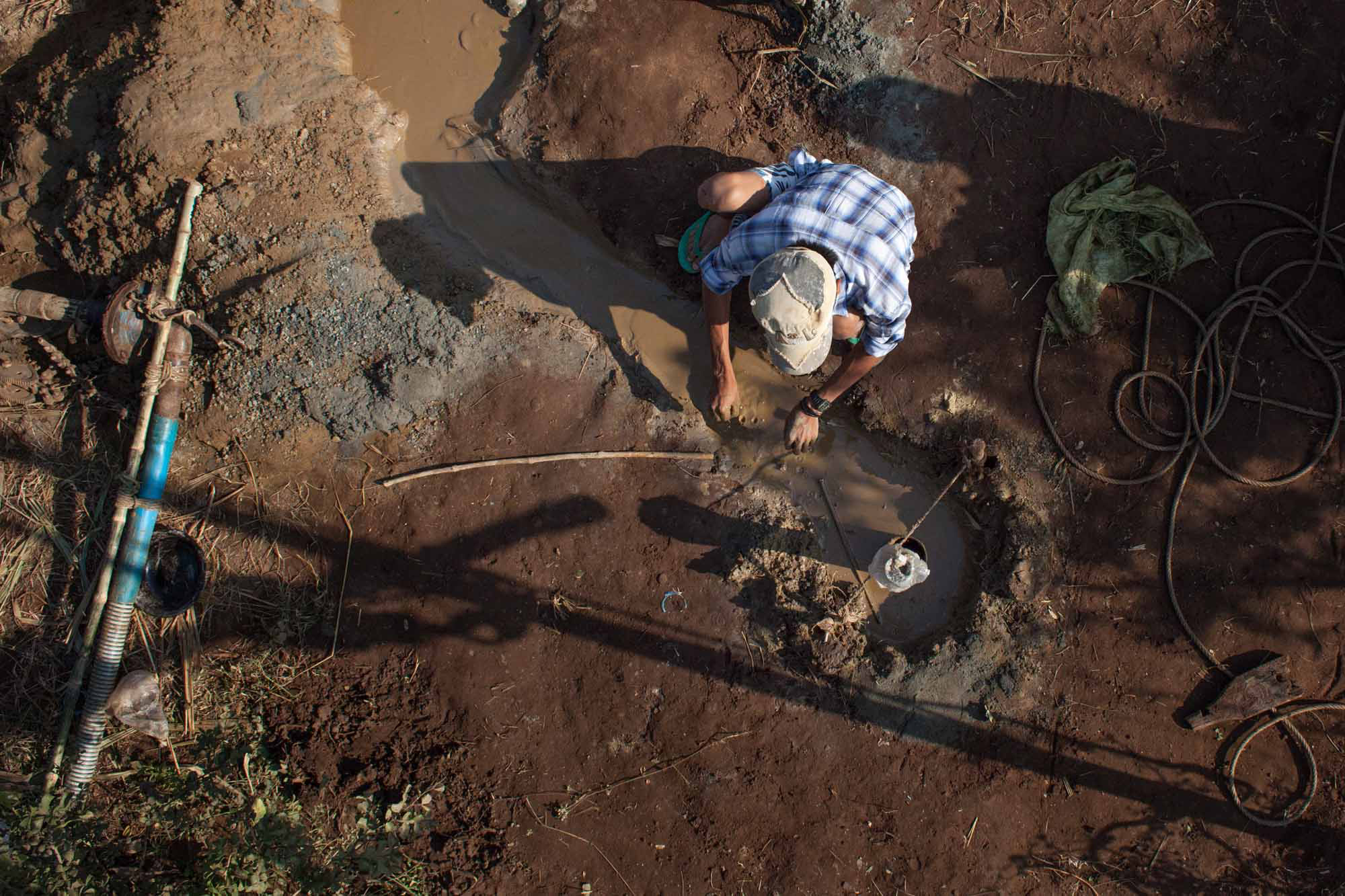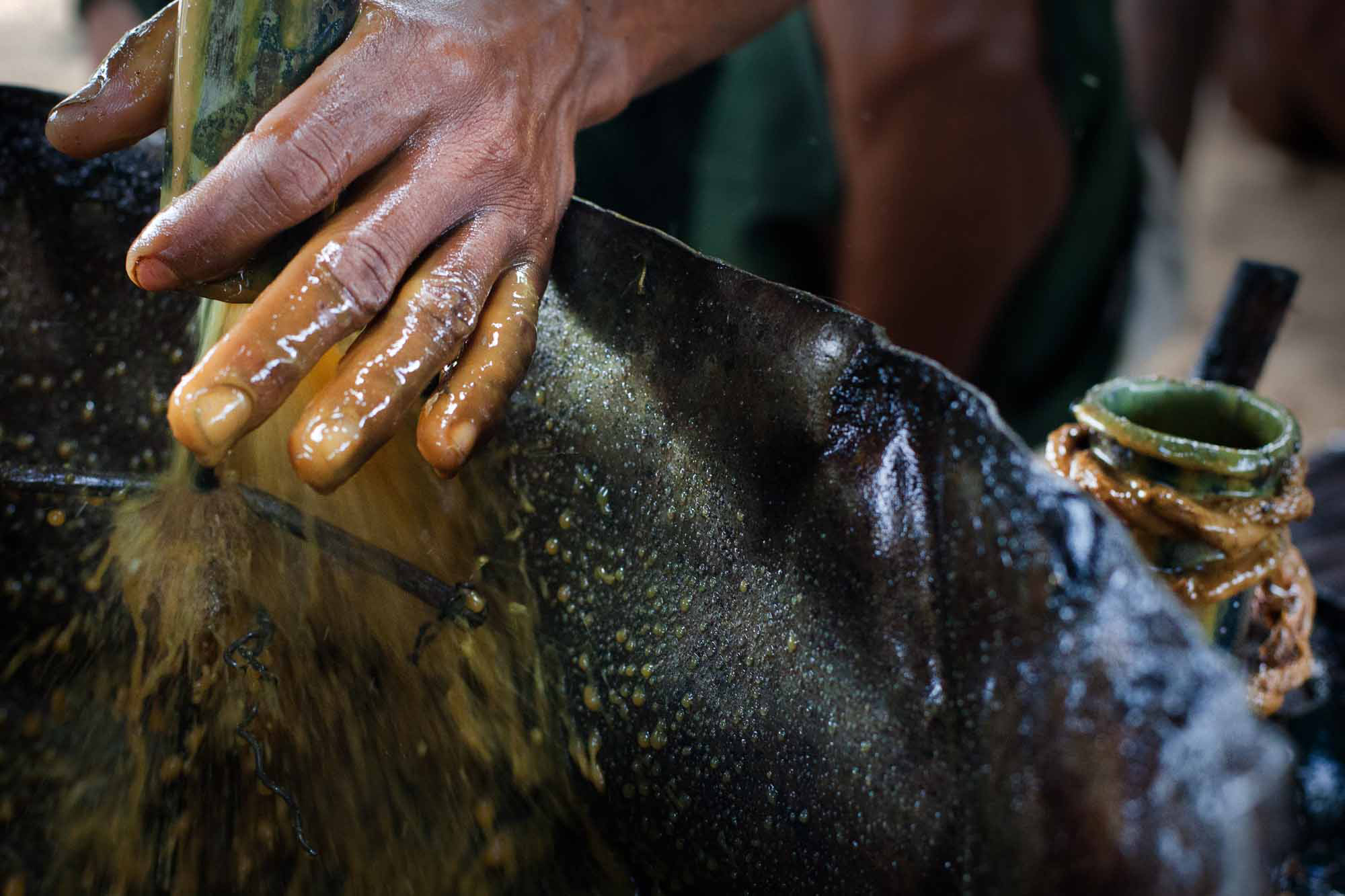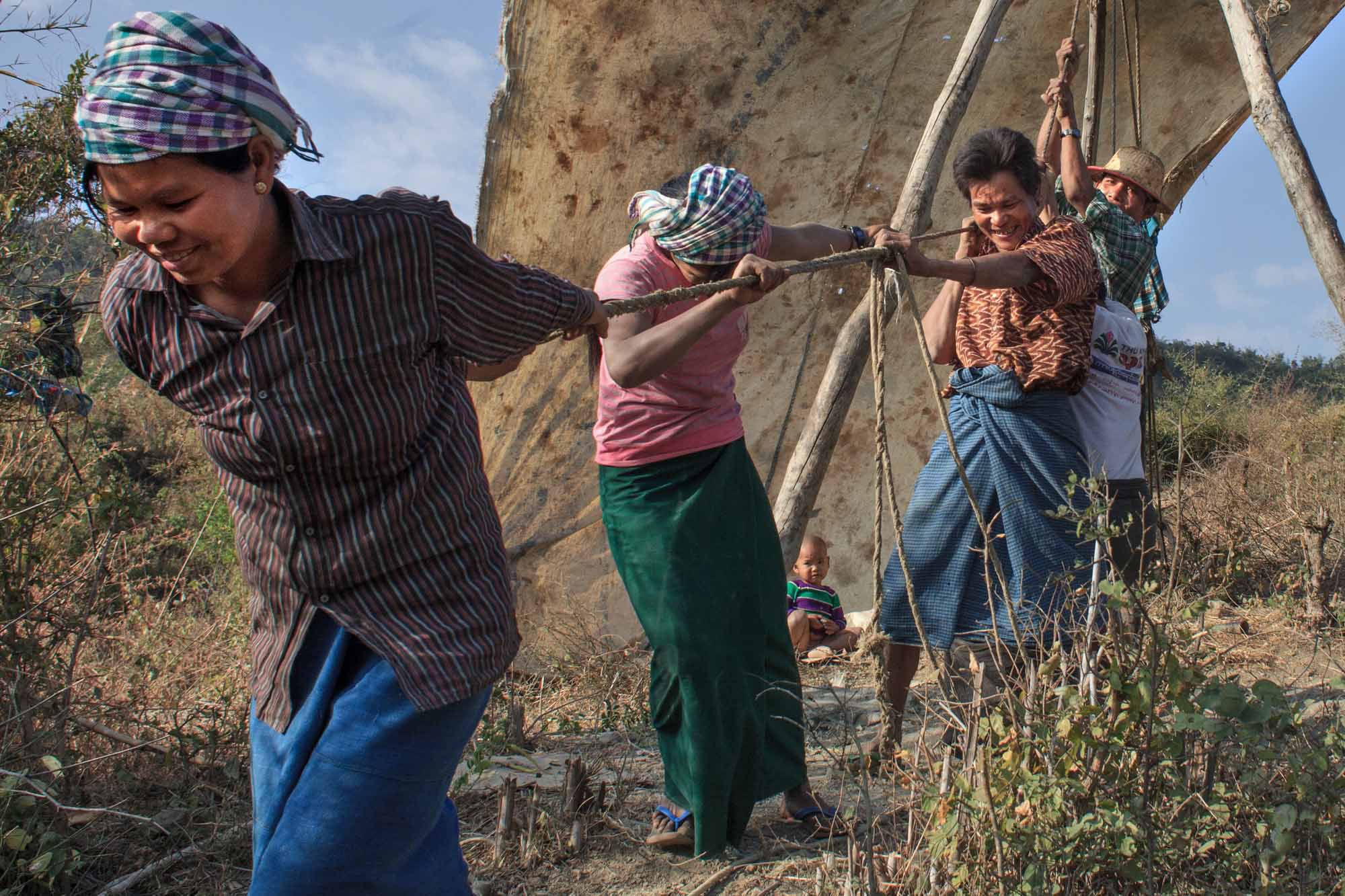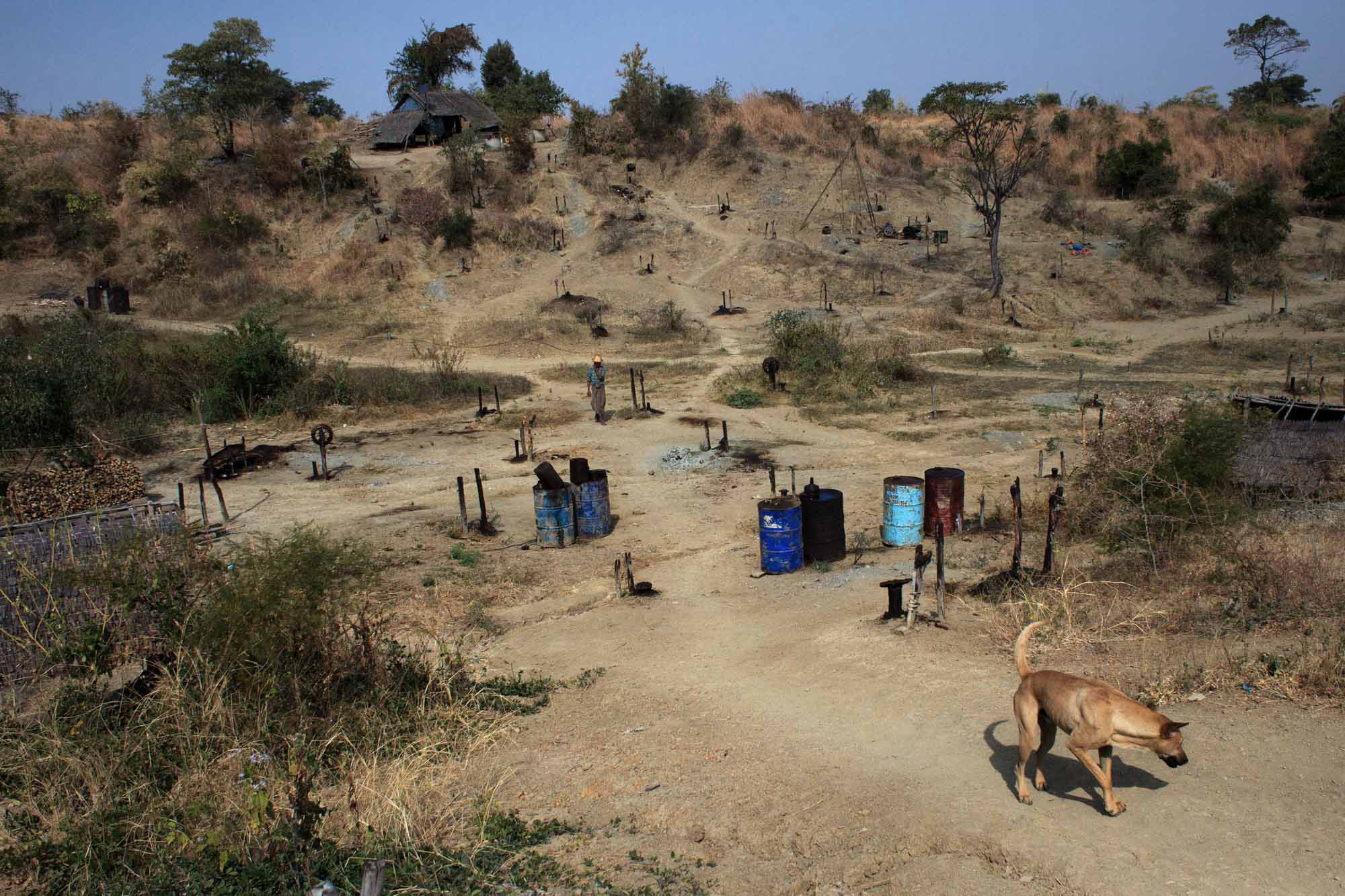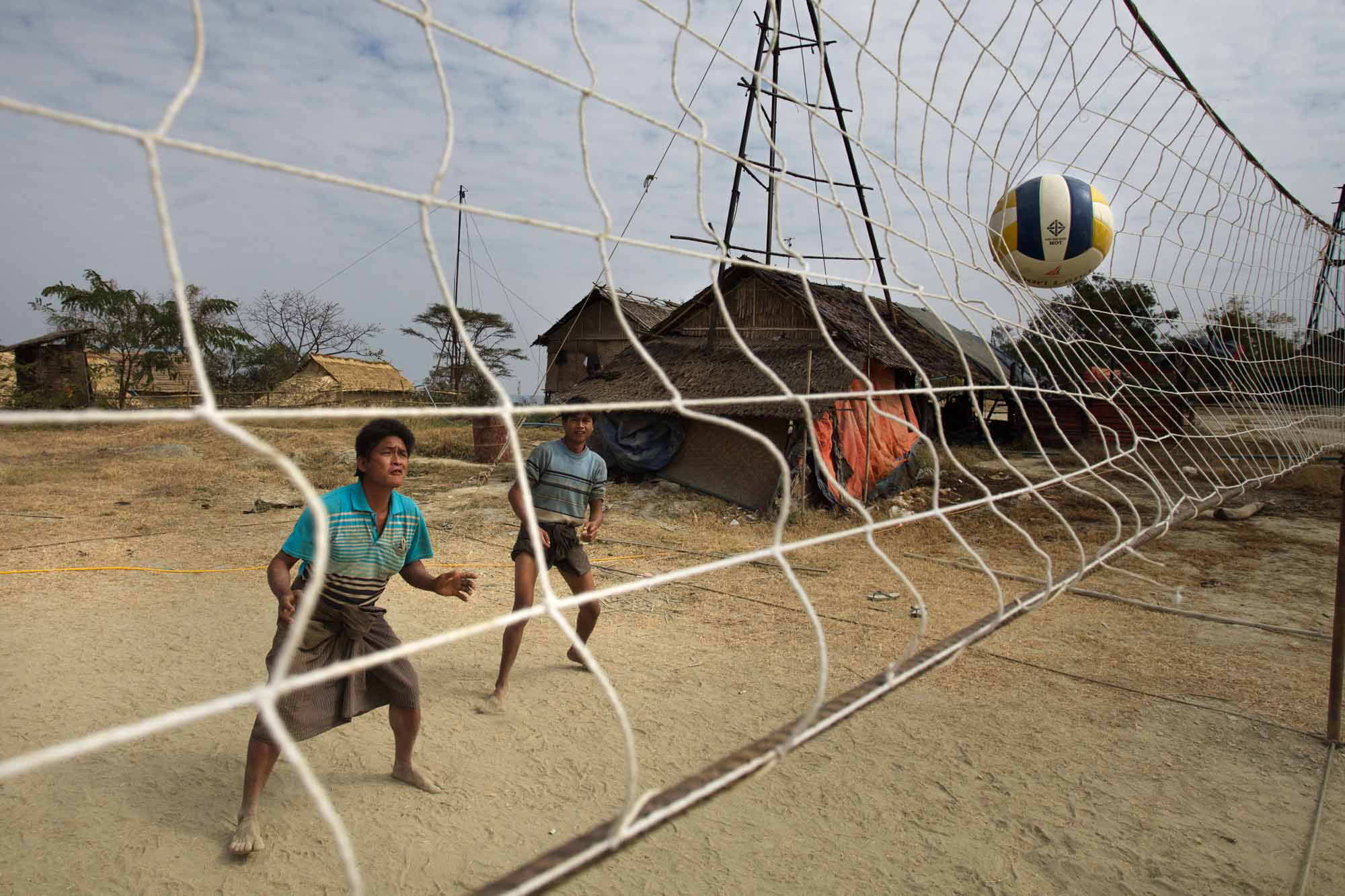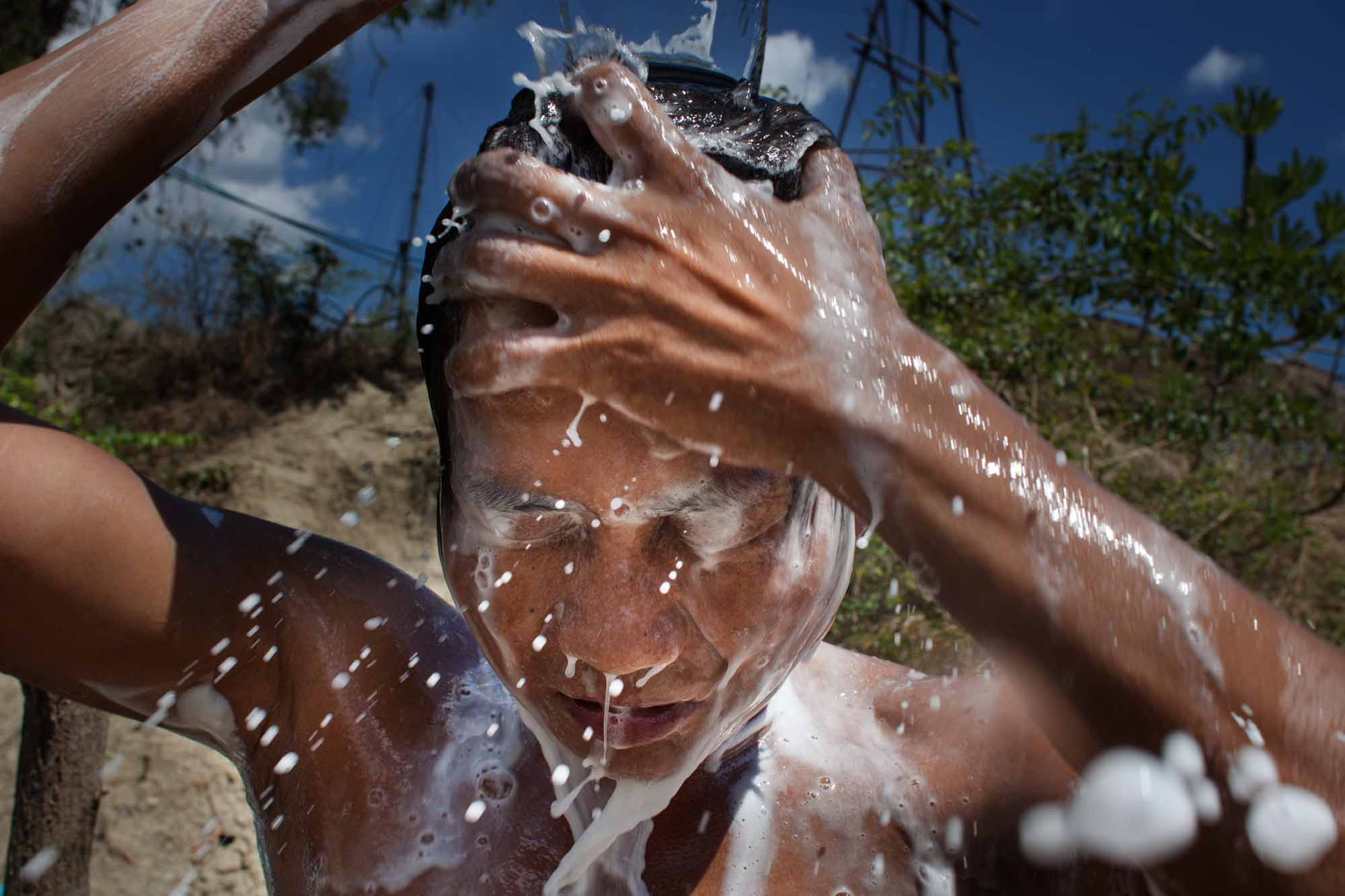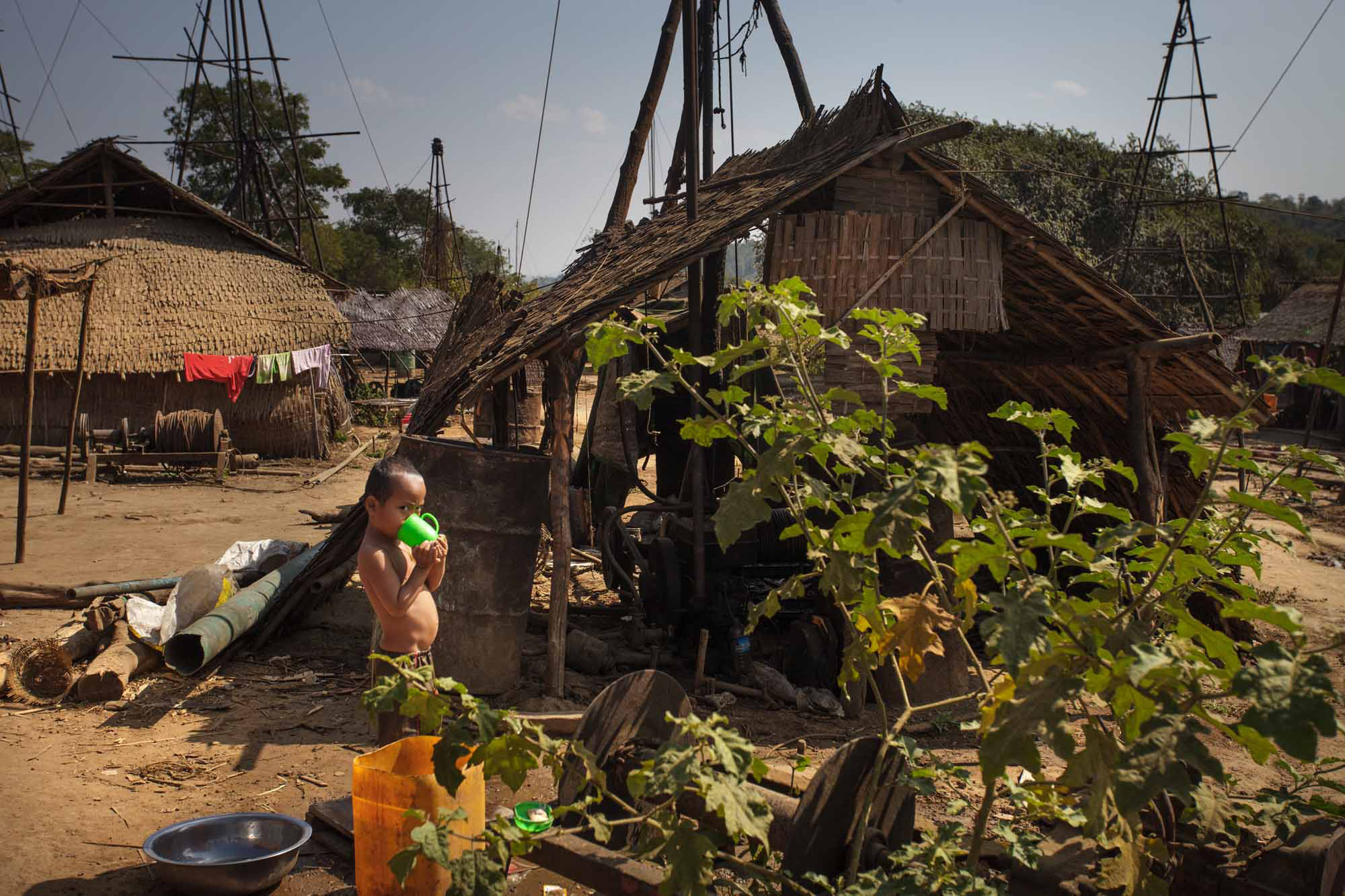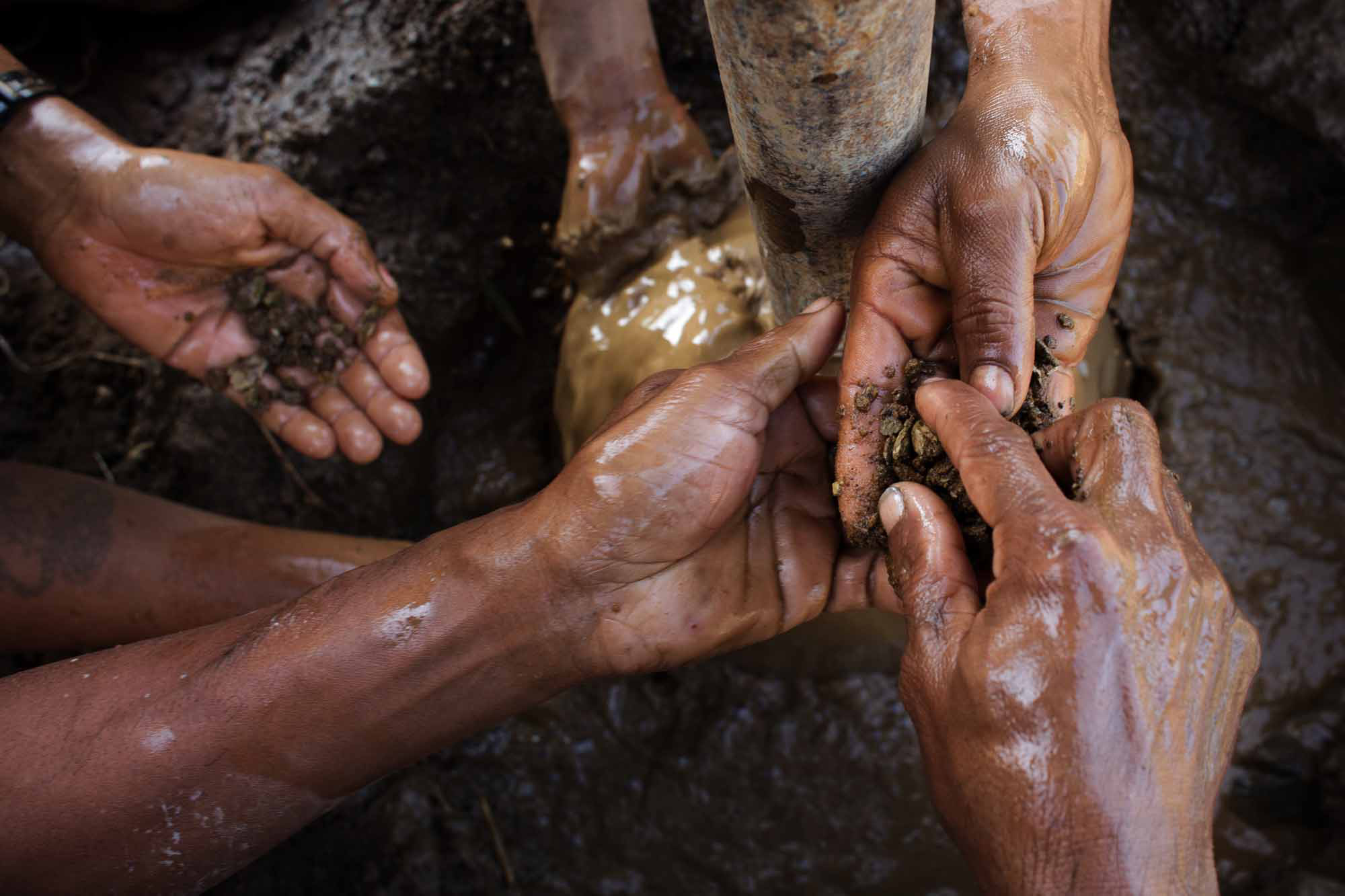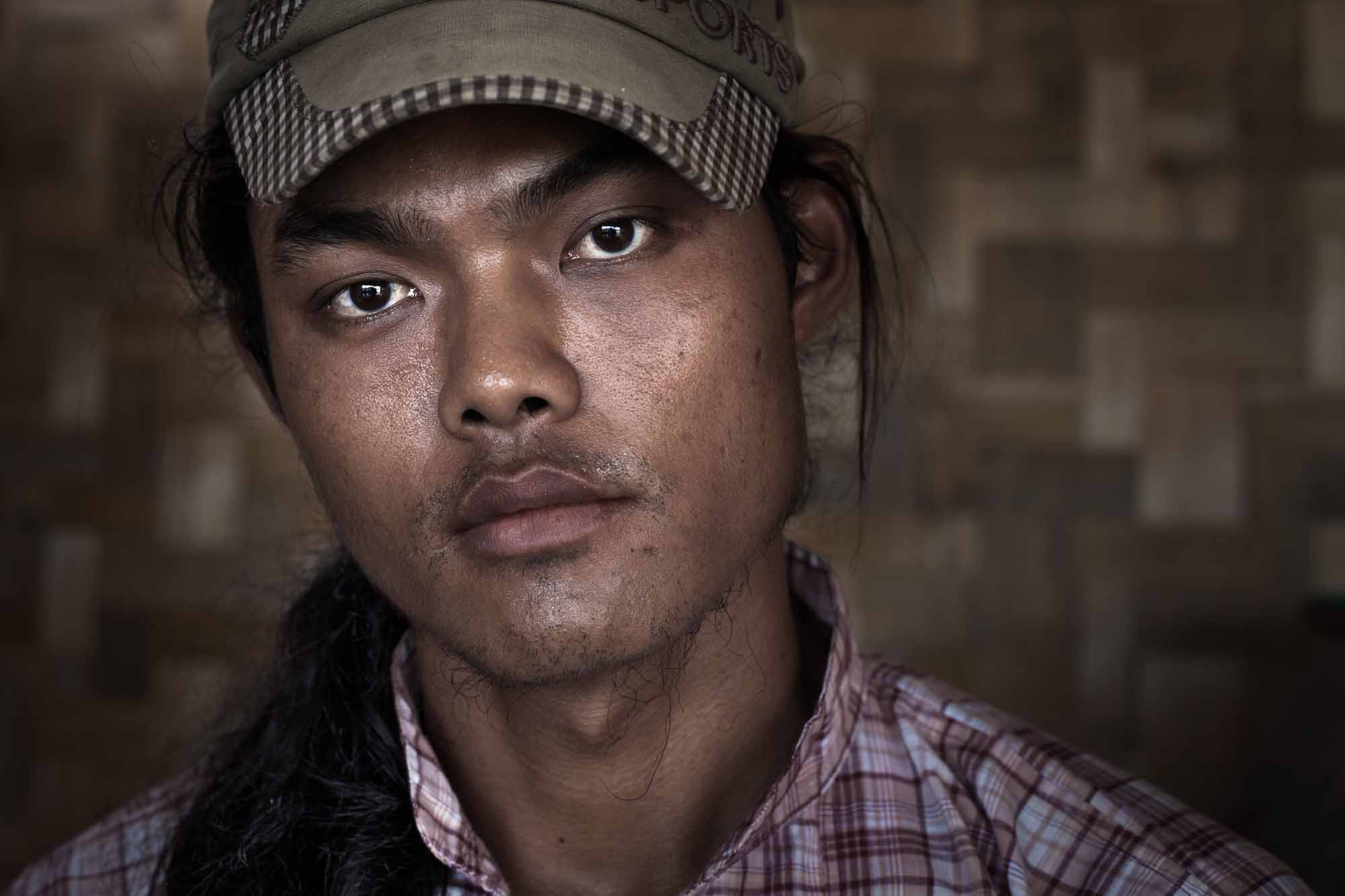The Oil Fields
The Oil Fields
"Drilling an oil well by hand can take two months.
No guarantees."
Since the change of government in 2011, multinational oil and gas corporations are coming back to Myanmar, where traditional methods of mining for oil have existed for centuries.
Manually, with not much more than pipes and ropes, hundreds of adventurers are digging wells in the oil fields near Sue Win village, in Myanmar’s Magway Region. The air is filled with the pungent smell of the black gold. As the drills penetrate the earth under the burning hot sun, the traditional miners monitor the soil samples for a blue colour, which is an indication of what they are all looking for: oil.
U San is one of the fortune seekers who lives and works in the oil fields with his family. U San’s land was confiscated by a government-run oil company about 20 years ago. Two years ago, however, he received permission to dig for oil on his own land. “Life is much better now,” U San says. “I used to earn half a dollar a day. Now I make enough to take good care of my family. We worry that the government companies will come back. If not, we are happy.”
The government-run companies that exploited the oil fields for decades drilled to great depths, but the simple rigs used by traditional miners like U San drill to only 300 feet. The miners have transformed the region into a messy industrial landscape: a strangely-structured chaos of drilling rigs, pipes, barrels and simple bamboo and palm-frond huts. Drilling a well by hand can take up to two months without any guarantees that, after slogging down through layers of hard soil and stones, oil will be found. Some get lucky and fill up to 500 barrels in less than a week, but most adventurers work hard to find only enough oil to fill 1 to 3 barrels in a whole month. Again others, who don’t dare to risk their savings on ropes, pipes and labour, choose to work for $2 a day, hand-drilling wells.
“I don’t want my life to be like the lottery.”
A bullock cart driver, who transports oil barrels to the selling points, finds it too dangerous to start digging for oil. “I don’t want my life to be like the lottery. A small well can eat everything: my house, my oxen, my life. I am afraid,” he said, before urging on his oxen to continue their ride up a narrow dirt road.
Mining for oil with wells sunk by hand has been a feature of the area around Yenangyaung in central Magway Region for almost 150 years (See box: Twinzas, twinzayos and twingyimins). There is evidence that the indigenous oil industry in the region may have been the world’s largest in the early 19th century. Initially, oil was harvested from seeps and soaks throughout the region’s scrub-covered rolling hills, but as the industry developed, wells were drilled manually in the oil-bearing earth near Yenangyaung, literally ‘The Creek of Stinking Water’.
The Burmah Oil Company, which dominated the industry in Myanmar during the colonial era, began producing oil at Yenangyaung in 1887. Other companies, big and small, have since drilled for oil or taken over existing wells in the areas around Yenangyaung and at Chauk, a field discovered in 1901. They are among seven oil fields in the Magway Region.
The indigenous industry received a boost after the government granted permission to explore for oil in the region in the mid-1990s. In the preceding decades, some residents had been evicted from their land to make way for big companies. Diminishing reserves created extraction challenges for companies and the exhaustion of oil from some areas saw sites abandoned and the land was returned to its previous occupants. Some regained their land in the 1990s, others, like U San, only a few years ago. Many poor farmers seized the opportunity to begin digging for the black gold once again.
Land owners ask traditional miners for a share of their profits, usually 20 to 25 percent. “For every five barrels, I have to give one barrel to the owner,” says Ko Maung Hla, who produces about one barrel of oil a month from his 20 wells. The bright-eyed young man sits with his wife and two-year-old son on a bamboo mat outside their simple home, while a rare breeze carried the sharp smell of oil.
A new era has been taking shape in the oil and gas sector once again since the change of government in 2011. The easing of sanctions by the United States and European Union has paved the way for the return of some of the world’s biggest oil and gas companies. Since 2013, the government has awarded a total of 36 offshore and onshore blocks to 46 foreign and Myanmar companies.
Many villagers living near the pipeline that exports oil to China have no electricity.
They include such oil majors as the Anglo-Dutch firm, Royal Dutch Shell, Chevron from the United States and France’s Total, which was already involved in Myanmar as the operator of the Yadana offshore gas field and pipeline. The Ministry of Gas and Energy signs production-sharing contracts with foreign companies and their Myanmar partners. These local companies are often owned by businessmen with close relations to the government. Some of them were previously subjected to EU and US sanctions. Before sanctions were lifted, the main investors were Asian companies, especially from China, India and Thailand.
One of the biggest hydrocarbons infrastructure projects in Myanmar is the 480-mile (770 km) dual pipeline that transports gas and oil from a terminal at Kyaukphyu on the Rakhine State coast to Kunming in China’s Yunnan Province. The China National Petroleum Company invested 2.5 billion US dollar in the project, which was completed early 2015 when the oil pipeline went into operation. The gas pipeline has been supplying China from the Shwe field off the Rakhine coast since July 2013. Ironically, many villagers living near the oil terminal, through which more than 20 million tons a year is being transported to China, have no electricity. The project has also fuelled conflict between the Myanmar army and ethnic armed groups active in areas along the pipeline. Forced evictions have been rampant.
“We need to listen and then we will follow the oil.”
Meanwhile, reserves at some of the oil fields in Magway Region are beginning to dry up. Landowners express concern about a decline in oil revenue – some have seen production drop with as much as 85%. As the fields become exhausted, the fortune seekers will try their luck elsewhere, leaving a legacy of empty wells that once fed their families. Some have already moved to oil fields elsewhere in the country, where they have heard about new discoveries. “We need to listen and then we will follow the oil,” one of the oil drillers says.
U Maung Myint
"The fortune under my feet"
The average prospector in the fields near Sue Win village looks muscled, but thin. Around their skinny bodies they wear clothes stained with oil. But one man looks different. His clothes are crisp and stretched tight around his protruding belly. Around his neck dangles a thick golden necklace. Meet U Maung Myint, a farmer who tried his luck in the oil rush in his village – and got incredibly lucky.
His lucky year was 2012. “In that year, I collected 250 barrels per month,” U Maung Myint said proudly, speaking loud enough for anyone standing nearby to hear. With a barrel price of 100 to 140 dollars, this amounts to roughly 35.000 dollars a month, an absolute fortune in Myanmar. From a poor farmer, he suddenly turned into one of the richest men of the village. While most houses in the small town are made of wood, U Maung Myint lives in a stone house with his wife and three children. His four-wheel-drive jeep is parked out in front. He is happy that he can give his three children a better future, with more opportunities than he had when he was young.
Less than 10 years ago, U Maung Myint was a poor farmer. He was not a very successful farmer and, in 2002, he decided to give up agriculture and try his luck in searching for oil He found nothing. Initially, the authorities did not allow him to search for oil on the farmland he owned, but that changed in 2006. U Maung Myint immediately started digging and his luck turned. Almost every well he dug was filled with oil. All those years, during which he hardly had enough money to eat, liquid gold had been flowing right under his feet.
U Maung Myint: “I have about 100 wells on 1 square kilometre of land.” Part of his land he still uses for growing crops. “I am farming again, but now I’ve hired workers,” he said, while he leaned on two giant, yellow trucks, which he referred to as his elephants. To those who can afford it, U Maung Myint rents out his land. They pay him an average of 20 percent of their earnings in return for the permission to dig a well on one of his plots. But, U Maung Myint claims, he has not forgotten that he was once poor and helps the people around him who struggle to make a living. Most of the help he provides is by creating employment opportunities. On his lands he has employed 60 people, most of them day labourers for farming or digging wells.
The day labourers who work in the oil search on his land get paid an average of 500 Kyats, or half a dollar, for every feet they dig. Depending on the amount of rocks blocking their path, the workers say they dig about 20 feet per day. For every well two workers are needed, leaving them with 10 US dollars each at the end of the day. These day labourers are often fortune seekers who do not have enough money to dig their own wells, which costs about 150 US dollars, or have spent all their money on digging wells, without finding oil.
The village of Sue Win does not have a bank, and neither do any of the surrounding villages. When fortune seekers get into financial trouble, and many of them do, rich men like U Maung Myint offer them a loan. The interest, however, is high and often plummets the workers further into depth. U Maung Myint charges an interest of 10 per cent.
Nonetheless, U Maung Myint sees himself as the great benefactor of the town as he chips in for village ceremonies. “I have provided a novitiation ceremony for the village.” This is an important ceremony for Buddhists in Myanmar during which young boys enter a monastery to study the teaching of the Buddha. Like most Buddhists who can afford it, he donates to the local monastery too. “In this life I started poor, but in the next life not anymore.”
While oil is becoming harder to find around Sue Win and U Maung Myint is only collecting 30 barrels a months these days, the lucky man is not worried. “I don’t believe I will lose.”
U Htein Nway
"You never know when you will be lucky"
When stories emerged about oil drillers earning thousands of dollars a month in his native town in upper Myanmar, U Htein Nway decided to return home. It turned out that his village, Sue Win, had become the centre of an oil rush, and U Htein Nway, 65, a blacksmith, was determined to be part of it. Never did he imagine, he would end up penniless.
When he first moved to the oil fields he owned a house, a small restaurant and had saved some money. Now, his clothes hang in rags around his skinny body and he is broke. The 10 to 15 dollars he earns each week working again as a blacksmith is nowhere near enough to support his large family.
From the small bamboo hut in this dusty area of Sue Win, which he shares with his wife and two of their six children, U Htein Nway reflects on the choices he has made. “With this business you cannot make a bad decision. If you think like that you cannot do this,” he said, while looking out over the bare plains.
U Htein Nway moved back to Sue Win village just over ten years ago. He invested $150 to dig his first well. For that amount he could pay workers to help him and buy the necessary materials. He got lucky. From his first well he collected up to seven barrels of oil each month which was worth about $700, a decent income to provide for his growing family. Encouraged by the success of his first attempt he invested another $150 to dig a second hole. When it turned out to be empty he dug another well until, ten attempts later, he still hadn’t struck oil.
“After that second hole, I lost everything.” He sold his house, spent his savings and closed down his restaurant so that he would have money to try again. Until, one day, everything he once owned was gone. “I sent my son to Magway to find a job and I could not afford my children’s education after they finished primary school.” One of his two daughters still living with him goes to primary school, while the other girl works to earn some extra money for her family.
After his misfortune, U Htein Nway developed an appetite for alcohol. A locally brewed sweet alcoholic drink, jungle beer, is cheaply available and popular among the oil workers. Like U Htein Nway, many workers constantly walk the tightrope between poverty and wealth – and alcoholism has become a coping mechanism for many.
Because oil in Sue Win is becoming harder to find and the wells are drying up, many workers are moving away. In the heyday of the oil rush in Sue Win village, next to alcoholism, drug abuse and gambling were large problems. Chinese opportunists, said the oil workers, set up shops in which almost anything was for sale, including drugs and women. Together with the abundance of oil, these shops have disappeared.
But social problems persist and divorces are common in Sue Win, as financial issues take their toll on family life. Despite their poverty, U Htein Nway and his wife are still happily married. “We made every decision together so there is no reason for us to fight,” his wife said.
The promise of oil riches remains irresistible to both of them and their spirits are high. U Htein Nway has no regrets about the past. In fact, he still believes that, one day, his fate might change. “If I have money I will try again. As long as I’m strong enough to do it. We never know if we will be lucky, we don’t know our fortune,” he said.
When he first moved to the oil fields, U Htein Nway’s dream was to become rich. Now his hope is to once again experience the thrill of the possibility to become rich, more than the money itself. It has been six years since his last attempt. When he talks about his plans for the future, his eyes sparkle. “My dream is to have enough money to try again.

